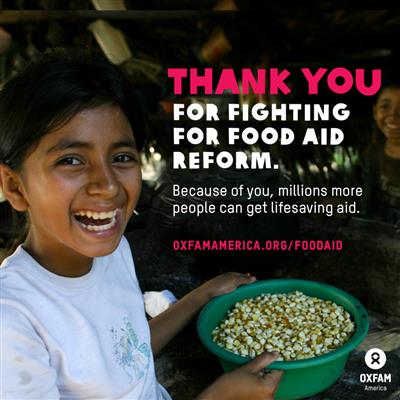Food aid reform in the Farm Bill: Progress and prelude of more to come
 The US provides emergency food aid like these sacks of rice and other humanitarian relief where it is needed, but local and regional procurement helps build the capacity of people and their governments to meet their own needs. Photo: Toby Adamson / Oxfam
The US provides emergency food aid like these sacks of rice and other humanitarian relief where it is needed, but local and regional procurement helps build the capacity of people and their governments to meet their own needs. Photo: Toby Adamson / Oxfam
After years of effort, Congress has finally made some real improvements to the international food aid programs that are part of the Farm Bill.
We don’t get to celebrate wins that often, so I want to make sure you hear about this one.
After years of effort, Congress has finally made some real improvements to the international food aid programs that are part of the Farm Bill.
What did we get? Here are the highlights:
- $80 million per year to be used to buy food locally, rather than shipped from the USA. The last Farm Bill authorized $60 million over 5 years for local and regional procurement. That’s a 666% increase!
- More transparency and oversight on selling food aid to make sure it does not waste taxpayer dollars or distort local markets. If selling food aid is going to lose a lot of money (i.e. achieve less than a 70% return), Congress must be notified. That should be an incentive to make sure the returns are higher. Also, more cash is included in the food aid budget so selling the food isn’t needed. A lot of the selling of food aid (also known as monetization) was motivated because aid agencies simply had no cash to run the food distribution programs.
- Reduced earmarking of the food aid budget, giving USAID and other government agencies more flexibility to do the job without inappropriate Congressional meddling. Specifically, a directive that a minimum of $450 million be used for “development food aid” has been reduced to $350 million. Still meddling, but not as much.
President Obama signed the Farm Bill on Friday. He didn’t mention international food aid in his speech. In the scheme of things, international food aid is very small potatoes, only about $10 billion in a roughly $1 trillion Farm Bill, but it’s a lifeline, literally, for tens of millions of people who need food. In 2012, more than 40 million people received US food assistance around the world. These people are often in the most desperate circumstances you can imagine; refugees, victims of natural disasters, survivors of violence, the poorest people on Earth.
Debate on how to improve these programs has been growing, and President Obama endorsed the food aid reform agenda with an ambitious proposal in 2013. A vigorous debate ensued in Congress, including a razor-thin, but unsuccessful, vote on food aid reform in the Farm Bill on the floor of the House of Representatives in June.
To be clear, the Farm Bill reforms are incremental. They go only a fraction of the way Oxfam believes we must travel on food aid. But they’re real. USAID thinks the changes could mean 900,000 more people could be helped with US food aid. This is a conservative estimate and Oxfam estimates the figure could be much higher.
Opposition to these reforms has been fierce with strong and aggressive lobbying by the maritime industry and some agriculture interests which benefit from the status quo.
Many of the improvements in the Farm Bill still require additional Congressional action through the budget and appropriations process. So, the job is not done and continued effort is needed for these reforms to be implemented. In addition, we must be vigilant against secretive lobbying by special interests, or budget-cutting mania. In January, for example, a technical change was slipped into the Omnibus Budget deal which means that the food aid program will not be reimbursed for higher shipping costs, effectively adding more than $50 million in costs to the program and therefor reducing the amount of assistance that can be delivered.
But those are concerns for tomorrow, or yesterday. Today we should feel good about what has been accomplished. And recognize and thank the many organizations and tens of thousands of individuals that have been involved and helping reform food aid.
So thank you and congratulations.
